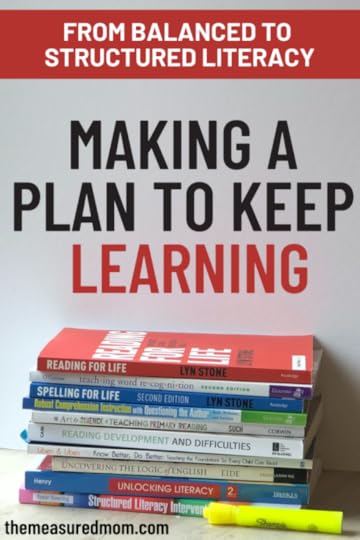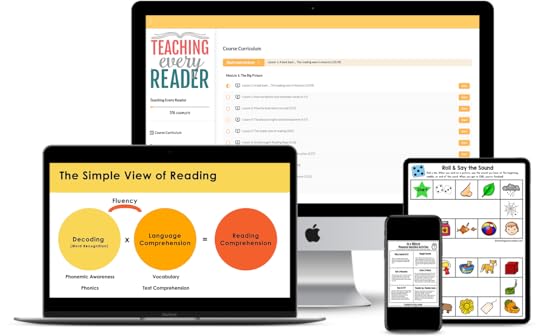How to learn more about the science of reading
Here are we are, at the end of our Balanced to Structured Literacy series!
You’ve learned:
And … now what? How can you make sure you keep learning?
That’s what today’s post is all about!

As you make a plan to learn more about the science of reading, let me explain what I’ve done over the last couple of years.
Step 1: I started by reading, reading, and reading some more. Know Better, Do Better was a great place to start.I reread Wiley Blevins’ book A Fresh Look at Phonics. I also reread Beck & Beck’s book, Making Sense of Phonics. I devoured Teaching Word Recognition (SUCH a good one!).I read Uncovering the Logic of English.(Those are some of the books I started with; other books I recommend for beginners are Shifting the Balance and The Art and Science of Teaching Primary Reading.
Check out this post!
Recommended Science of Reading books
Step 2: As I kept reading, I talked with teachers who had moved from balanced literacy to a more structured approach (lots of evenings on Google Meet!).
I can’t re-create those meetings for you, but in the summer of 2022 I published a 10-part podcast interview series with people who had transitioned from balanced to structured literacy.
You can listen to them right on the website!
Savannah Campbell from Campbell Creates Readers Christina Winter from Mrs. Winter���s Bliss Heidi Jane from Droppin��� Knowledge with Heidi Lindsay Kemeny , podcast host and classroom teacher Jessica Farmer from Farmer Loves Phonics Gina from Get Literacy Margaret Goldberg from the Right to Read Project Sarah Paul from Sarah���s Teaching Snippets Jan Burkins and Kari Yates , authors of Shifting the Balance Dr. Wendy Farone , LETRS trainer, Title 1 reading specialist (and a lot more!)Step 3: Early on, I joined a big science of reading Facebook.I admit – at first I could only be in them for ten minutes at a time because it was so overwhelming. But now I love to go and take notes, get book recommendations, or learn about new workshops.
Recommended -> Facebook group: Science of Reading: What I Should Have Learned in College
Step 4: I was also listening to science of reading podcasts.This list includes podcasts I listened to at the beginning of my journey as well as those I’ve recently discovered.
Science of Reading: The Podcast Teaching, Reading & Learning: The Podcast Literacy Talks Reading Teachers Lounge Melissa & Lori Love Literacy Edview 360After I had some knowledge under my belt, I began recording science of reading episodes on my own podcast, Triple R Teaching.
(And then, a couple of years later, I replaced my pre-epiphany episodes (1-33) with solid, science of reading-based ones.)
Step 5: All along, I watched free trainings online.Here are some favorite YouTube channels!
SoR-What I Should Have Learned in CollegeThe Reading LeagueOregonRTIiReading Science AcademyReading SimplifiedReading RocketsStep 6: Eventually I joined paid courses. Big Dippers CORE Online Elementary Reading Academy Top Ten Tools Keys to Beginning Reading Step 7: After all of this, I completely updated my online course so that it fully aligns with the science of reading.Becky Spence (This Reading Mama) and I open Teaching Every Reader twice a year, and it opens next on October 10, 2022!
 Learn more about the course here!Teaching Every reader will help you …Gain a solid understanding of the science of reading and understand its practical application.Improve your knowledge of phonemes, phonics, syllable types, and other essential understandings about the English language.Discover simple assessments that will help you pinpoint exactly what your students need to learn next.Get tried and tested tools for teaching phonemic awareness and phonics, building vocabulary, and improving comprehension.Learn how to deliver a powerful and engaging whole group reading lesson.Become a pro at planning and delivering small group lessons that accelerate student learning.Save hours of time with a huge variety of practical, low-prep activities … so you can get back your time while doing the very best for your students.Unlike many other online courses, your access to ours will not expire.
Learn more about the course here!Teaching Every reader will help you …Gain a solid understanding of the science of reading and understand its practical application.Improve your knowledge of phonemes, phonics, syllable types, and other essential understandings about the English language.Discover simple assessments that will help you pinpoint exactly what your students need to learn next.Get tried and tested tools for teaching phonemic awareness and phonics, building vocabulary, and improving comprehension.Learn how to deliver a powerful and engaging whole group reading lesson.Become a pro at planning and delivering small group lessons that accelerate student learning.Save hours of time with a huge variety of practical, low-prep activities … so you can get back your time while doing the very best for your students.Unlike many other online courses, your access to ours will not expire.And any time we make additions or updates to the course content, they’re yours for free!
Here’s what one teacher had to say!
The course is by far the best PD I have taken in my 24 year career as a teacher. A lot of what I learned I knew intuitively but lacked the scope and sequence and the breadth and depth that I could never have achieved on my own. I feel a lot more prepared to return to school in September with tools and knowledge to help me expand my practice with clear goals and expectations. I am a lead teacher in literacy and special education and I am excited to use the information I learned in Teaching Every Reader to work toward building capacity in other educators, as well as with my small groups of students.
Sincerely,
Colleen C.
The post How to learn more about the science of reading appeared first on The Measured Mom.
Anna Geiger's Blog
- Anna Geiger's profile
- 1 follower



